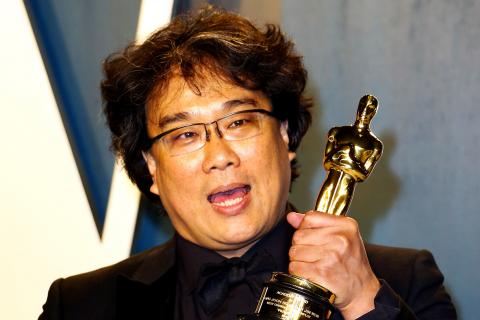South Korea’s status as a cultural juggernaut just got a serious shot of international credibility.
Parasite, a dark comedy about the divisions of wealth and class, became the first foreign-language film in history to win the coveted Oscar for best picture. The movie — made for US$11 million by Seoul-based Barunson Entertainment & Arts — beat out Hollywood competitors made for nine times as much.
The win, which ignited celebrations online in South Korea, could mark a watershed moment for its entertainment industry that’s become a key form of soft power for the Asian nation with the explosion of K-Pop and Korean soap operas. Cultural exports are also becoming more vital to South Korea’s economy, which is pivoting away from the manufacturing-focused industries that helped it emerge from the ruins of the Korean War.

Photo: AP
Parasite has so far grossed US$165 million at the box office, a number that’s likely to jump after the movie’s surprise victory, which will likely lead to a re-release in the US where its theatrical run is already almost over. In 2017, winning best-picture prize bolstered the commercial prospects of the American coming-of-age drama Moonlight, which made about US$65 million on a similarly modest production budget of about US$4 million.
The past decade has seen an evolution in South Korea’s status as an entertainment powerhouse, with the world’s most popular boy band, BTS, driving a global embrace of the K-Pop music genre. The country’s television industry is responsible for a wave of romantic dramas that have achieved cult status throughout Asia, particularly in the hard-to-crack, but immense Chinese market. The success of Baby Shark, a viral YouTube hit targeted at children that spawned a merchandise empire, also showed South Korea’s growing foothold in online content.
PRESIDENTIAL PRIDE

Photo: EPA-EFE
Smaller in scale, the South Korean film industry still brought in about US$2 billion in 2018, according to the latest available data from Korea Creative Content Agency — a body linked to the nation’s culture ministry.
South Korea erupted in collective celebration at the news of Parasite winning the Oscar, with messages of congratulations and joy trending on social media platforms such as Twitter. The country’s president, Moon Jae-in, tweeted his pride at the film’s success. Shares of Barunson Entertainment surged as much as 17 percent Tuesday in Seoul, extending their 19 percent rally the previous day. The stock of the chief investor and marketer of the film, CJ ENM, rose as much as 4.3 percent on Tuesday.
“This will become a turning point for Korean movies to grow globally,” said Kim Young-ho, spokesman for the Korean Film Council. “It’s the most splendid achievement.”
Parasite tells the story of a family of unemployed people that entrenches itself in the life of a wealthy clan to gain access to things they can’t afford. A foreign film winning the best-picture prize marks a break from tradition at a time when the Academy of Motion Picture Arts and Sciences, which awards the Oscars, is under fire for failing to diversify its ranks and the recipients of its awards.
Parasite beat competitors such as Once Upon a Time in ... Hollywood, which had a budget of about US$95 million and 1917, the favorite to win the award, which cost a similar amount to make.
Besides best picture, Parasite took home several other top prizes, including for best director, best international feature film and best original screenplay.
“This is definitely an event that will raise global attention on Korean content, expanding the boundary into movies — not only TV drama or K-Pop,” said Sang-Woung Han, an analyst at Eugene Investment & Securities.
Industry executives partly credited Miky Lee, vice chairman of CJ Group — South Korea’s largest purveyor of TV programs and movies as well as food and home-shopping services — for the movie’s success. CJ ENM said it would continue to help Korean movies break into the global market.
Lee, the 61-year-old granddaughter of Samsung Group’s founder has been a relentless promoter of Bong and other Korean directors and actors.
“Parasite won the best picture because the movie has successfully delivered on the universal issue of economic polarization,” said Jeon Chan-il, a long-time Korean film critic.
Parasite director Bong Joon-ho’s two prior movies, Snowpiercer and Okja did not do well at the box office in the US, but they are now two of the most popular movies on Netflix. Accepting the best director award late Sunday in Los Angeles, he said he never thought he would win.
Later, speaking to reporters backstage, he said he hoped a non-English film winning such top prizes won’t be rare in the coming years.
“It’s very surreal,” Bong said. “I feel like something will hit me and I will wake up from this dream.”

The unexpected collapse of the recall campaigns is being viewed through many lenses, most of them skewed and self-absorbed. The international media unsurprisingly focuses on what they perceive as the message that Taiwanese voters were sending in the failure of the mass recall, especially to China, the US and to friendly Western nations. This made some sense prior to early last month. One of the main arguments used by recall campaigners for recalling Chinese Nationalist Party (KMT) lawmakers was that they were too pro-China, and by extension not to be trusted with defending the nation. Also by extension, that argument could be

Aug. 4 to Aug. 10 When Coca-Cola finally pushed its way into Taiwan’s market in 1968, it allegedly vowed to wipe out its major domestic rival Hey Song within five years. But Hey Song, which began as a manual operation in a family cow shed in 1925, had proven its resilience, surviving numerous setbacks — including the loss of autonomy and nearly all its assets due to the Japanese colonial government’s wartime economic policy. By the 1960s, Hey Song had risen to the top of Taiwan’s beverage industry. This success was driven not only by president Chang Wen-chi’s

Last week, on the heels of the recall election that turned out so badly for Taiwan, came the news that US President Donald Trump had blocked the transit of President William Lai (賴清德) through the US on his way to Latin America. A few days later the international media reported that in June a scheduled visit by Minister of National Defense Wellington Koo (顧立雄) for high level meetings was canceled by the US after China’s President Xi Jinping (習近平) asked Trump to curb US engagement with Taiwan during a June phone call. The cancellation of Lai’s transit was a gaudy

The centuries-old fiery Chinese spirit baijiu (白酒), long associated with business dinners, is being reshaped to appeal to younger generations as its makers adapt to changing times. Mostly distilled from sorghum, the clear but pungent liquor contains as much as 60 percent alcohol. It’s the usual choice for toasts of gan bei (乾杯), the Chinese expression for bottoms up, and raucous drinking games. “If you like to drink spirits and you’ve never had baijiu, it’s kind of like eating noodles but you’ve never had spaghetti,” said Jim Boyce, a Canadian writer and wine expert who founded World Baijiu Day a decade